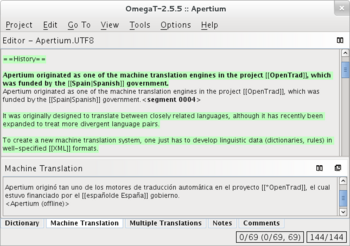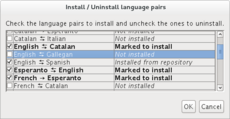Apertium-OmegaT
Apertium-OmegaT is a plug-in for OmegaT built on top of lttoolbox-java that offers offline machine translation from Apertium.
Requirements
- A working installation of OmegaT
And that's all! Apertium-OmegaT can work on any platform (Linux, OS X or Windows), and it does NOT require installing apertium, lttoolbox or lttoolbox-java.
Installation
Note: After Apertium's migration to GitHub, this tool is read-only on the SourceForge repository (the link below) and does not exist on GitHub. If you are interested in migrating this tool to GitHub, see Migrating tools to GitHub.
Download it from here and copy it to the plugins/ directory of your OmegaT installation. The folder in question is the folder that contains the OmegaT.jar file, for the Mac version this is e.g. the /Applications/OmegaT_3/OmegaT.app/Contents/MacOS/Java/ directory.
The next time that you run OmegaT, it will ask you where to save language pair packages, and offer the possibility to install the ones you want. You will now have a new option at Options → Machine Translate called Apertium (offline), which has to be checked to activate the plug-in. If you want to configure the plug-in or manage language pairs (i.e. install, uninstall or update them), go to Options → Apertium settings.
Supported language pairs
Apertium-OmegaT offers the possibility to install, uninstall and update language pairs within the application. This feature is supported for all the 25 released pairs for which ready-to-use packages are maintained.
Unreleased language pairs or language pairs with external dependencies (for instance, the 6 released language pairs that depend on CG) are also supported. However, ready-to-use packages are not maintained for these pairs, so you will need to create the packages by yourself, and copy them to the directory in which you have the rest of the packages. Note that, for the language pairs with external dependencies, you will need to install those dependencies first. For instance, you will need to install CG for the pairs that depend on it.
Troubleshooting
- The option Apertium (offline) does noe show up, despise apertium-omegat.jar being installed in the same folder as OmegaT.jar

